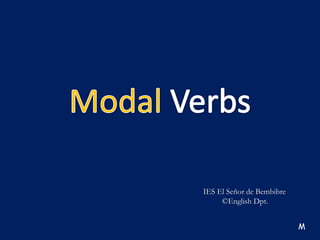
Modal Verbs
- 1. IES El Señor de Bembibre ©English Dpt. M
- 2. can / could must / have to shall / should may / might will / would And *to have to need (to) ought to These are the Modal Verbs
- 3. Remember Modal verbs are SPECIAL because they have NO -s in the 3rd person singular: She can swim NO do is used with them, neither in the questions or in the negatives: Can you swim? You must not do it! NO to, neither in front, nor behind: You should study harder! Except *to have to and ought to
- 4. Because They have no infinitives or participles. They do not have tenses or past forms They do not have a person ending. Except *to have to
- 5. Modals are used to express: OBLIGATION must *have to PERMISSION can may could ADVICE must should ought to NON-OBLIGATION need not *don’t have to PROHIBITION mustn’t can’t CRITICISM should not POSSIBILITY may can could might ABILITY can could *to be able to FUTURE will CONDITIONAL would
- 6. Obligation MUST and HAVE TO MUST is personal, to give our personal opinions / feelings: We must speak English here. * HAVE TO is impersonal, for facts / rules / law / tradition: We have to speak English here.
- 7. Permission CAN, MAY and COULD They are most used in questions. CAN is more informal, whereas MAY sounds more formal: Mom, I’ve finished. Can I go now? Mr. Smith, I’ve finished. May I go now? COULD sounds very polite: Could you show me how to get to the station, please ?
- 8. Advice MUST, SHOULD and OUGHT TO They are used to express what the speaker thinks is good to be done, it is a recommendation. SHOULD means I think it is something good, but you do not do it Oh, you look tired! You should go to bed. MUST means I think is something good, so I tell you. You must apologize, that’s the right thing to do *OUGHT TO can be used instead of SHOULD, it is less frequent and takes TO. You ought to study the modal verbs
- 9. Non-Obligation DON’T HAVE TO - It takes -S, needs do/does/did and has tenses! Today is Sunday! You don’t have to go to school. NEEDN’T - It takes -S, may use do/does/did and has tenses! We needn’t use the key, the door is open.
- 10. Prohibition MUSTN’T and CAN’T MUSTN’T means it is forbidden: You mustn’t bring mobiles into the classroom. It’s totally prohibited. CAN’T is not so strong. She can’t travel alone. It’s too dangerous!
- 11. Criticism SHOULDN’T It means that something that is wrong doing is usually done, so we criticise it You shouldn’t drink alcohol. The students shouldn’t talk so much like that! OUGHT NOT TO can be used like SHOULDN’T, but it’s quite uncommon and rather formal.
- 12. Possibility MAY, MIGHT and COULD MAY and MIGHT means the same MAY sounds a little more certain than MIGHT, as if the thing is not very likely to happen. She may go to the party = maybe she’ll go Tricia might go to the party = she probably won’t go COULD sounds the same, or a little doubtful: I could go to the party, too. = maybe I will go, I’m still not sure
- 13. Ability CAN and COULD CAN is used to say that one has the ability / capacity to perform an action, or knows how: Brian can ride a bike for about two hours.” COULD is used to talk about a past ability: Last year I could swim about 500 meters a day.
- 14. Conditional WOULD / WOULDN’T To invite someone to do something: Would you like a coffee? It is also used in the second conditional clauses I would go if I had time Conditional sentences will be studied separately.
- 15. PAST and MODALS Any modal verb can be used in the past tense, but since most modals don’t have a past form, the structure is changed to show it is a past action: S + MODAL + HAVE + V + ed/ 3rd f irreg. = past participle This structure remains the same, no matter the modal verb, She could have told me before buying the house. It must have been love, but is over now It is also used in the third conditional clauses I would have gone if I had had time Conditional sentences will be studied separately.
- 16. *Notice that: Some verbs are not “real” modals, but they are used and studied likewise. They are: HAVE TO / NOT HAVE TO / TO BE ABLE TO These verbs can change into the 3rd person singular with an –s They can change into past tense without the have + past participle structure (ex HAVE TO / NOT HAVE TO /OUGHT TO / TO BE ABLE TO These verbs are followed by the “TO” infinitive with any verb, it’s part of its own structure. TO BE ABLE TO/ CAN To be able to is similar to can, but not so usual. It’s used where can is not possible: I won’t be able to go there. CAN has no future because modals do not have infinitive!
- 17. If you have read the theory and watched this presentation carefully and still have doubts about this theme, PLEASE! ask your teacher for further explanation.
